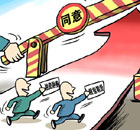-
-
China Daily E-paper
Liang Hongfu
Good gadgets are about looks, too
By Hong Liang (China Daily)
Updated: 2010-02-12 07:20
 |
Large Medium Small |
All my geek friends have been talking about Apple's iPad since its launch last week. I am not a geek. But all those electronic tools and toys gathering dust in the cupboards and drawers can attest to my credential as a gadget freak.
As soon as I heard the news about this device, I searched my gadget inventory and retrieved two items that fit the description of the iPad in look as well as function. These are the so-called touch-screen tablet computers. One of them has a fully articulate screen attached to a diminutive keyboard, and the other is just a screen with some function keys on the hand holders.
They have been laying in the cupboard for many months because I couldn't find much use for either of them. With my piggy bank fattened by the expected tax rebate, I think I won't be able to resist buying the iPad when it hits the market in a few months time.
Many technical writers have declared 2010 the year of the tablet computers.
I believe that the time for these devices will come as soon as someone has the smartness and clout to establish a new order in the publishing industry, allowing readers like us to purchase and read online books, magazines and newspapers at anytime we choose and at a price we don't mind paying.
That someone could very well be Steve Jobs, Apple's charismatic founder and CEO, who is widely believed to have revolutionized the music industry.
Apple's iPod may not be the last word in MP3 or MP4 music players. Chinese and Japanese electronics companies are known to have produced and marketed better designed and better sounding devices. But no competitor has created a set of software with the ease and grace of use that comes close to Apple's iTunes.
With tens of millions of iPods sold around the world, Jobs has gained the influence and clout to convince, or bully, as distracters would say, most of the world's major music production houses to abandon the old practice of selling music by albums. Instead, they have agreed to sell individual titles online through Apple's music store that can be accessed on iTunes.
Many book and newspaper publishers are anticipating similar changes in their industry brought about by a proliferation of iPads and other tablet computers.
Indeed, some major newspaper publishers in the United States, including the New York Times, are said to have prepared a special format of their publications for reading on tablet computers.
Chinese computer manufacturers, too, are watching the development of the tablet closely.
A Shenzhen electronics manufacturer has reportedly claimed that months before Jobs unveiled Apple's iPad, it had been producing and marketing a similar product that is said to be even more powerful and with more built-in functions than most tablet computers in the market. This is not surprising.
The manufacturing clout of Chinese enterprises and their capabilities of cramming more power and functions into a product than their overseas competitors are well known.
But they lack the design flare and marketing skill, or hype, in which Apple and some other foreign competitors excel.
Various models of Lenovo's laptop computers have won rave reviews in the foreign press. When it comes to value for money, Lenovo should be among everybody's top choice. But do I want one?
Probably not, because no matter how good its products are, the brand simply fails to excite.
Chinese enterprises should seize the opportunity at this early stage of the tablet computer market to position themselves in winning a global share that can reflect the much touted fact that there are more Internet users in China than any other country on the planet. Otherwise, these numbers have no value other than mere statistical interest.
E-mail: jamesleung@chinadaily.com.cn
(China Daily 02/12/2010 page9)









